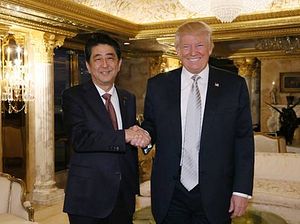Japan is growing increasingly worried about U.S. President Donald Trump’s trade tactics – a concern that has driven Tokyo to pointedly remind Washington of their close security ties.
When the Trump administration first imposed tariffs on steel and aluminum imports in early March, Japan kept relatively quiet in the public domain and sought to pursue the matter privately, hoping that the personal rapport that Prime Minister Shinzo Abe had worked so hard to develop with Trump might yield results. While Japanese Foreign Minister Taro Kono initially described the move as “regrettable,” the public response was nowhere near as blunt as that from the European Union, which outlined specific plans for retaliatory tariffs.
Japan failed to win an exemption, even though many of close U.S. allies secured carve outs (some of which have since expired, causing further friction). Last month, Tokyo filed a notification with the World Trade Organization (WTO) that it reserves the right to impose counter-measures. The notification estimated that Japan faced a $415 million annual hit from the 25 percent tariff on steel and a $25 million impact from the 10 percent tariff on aluminum.
With the Trump administration launching a similar national security-related investigation into automotive imports in the past couple of weeks, Japan is seriously alarmed. The U.S. is the biggest market for Japanese carmakers, underpinned by a trend of production moving to the United States. Japan’s economy would take a hit equivalent to 0.1 percent of GDP (or about $5 billion) if Washington slapped tariffs of 25 percent on imports of cars and car parts, according to modeling by Germany’s ifo Institute. This comes as policymakers digest the news that Japan’s economy contracted in the first quarter of this year – marking the end of a two-year run of uninterrupted quarterly growth.
This might help explain why Japan has taken a noticeably stronger public position on the possibility of auto tariffs. Economy, Trade, and Industry Minister Hiroshige Seko said such tariffs “would be an extremely far-reaching trade sanction that would put the global market into turmoil.” He added: “We are extremely concerned.”
Abe, who is due to meet Trump at the White House this Thursday, told the National Diet last week: “We can’t accept this.” The prime minister had been responding to a question about the existing metal levies and the possible forthcoming tariffs on auto imports, Bloomberg reported. Abe continued: “From a security perspective, it’s very difficult to understand why this would be imposed on Japan, a military ally.”
Trade has emerged as a difficult issue in U.S.-Japan relations since Trump’s election. After an initial disagreement on the Trans-Pacific Partnership, Trump has pushed for Abe to agree to open negotiations on a bilateral free trade agreement – all while Trump seeks a reduction in Japan’s hefty trade surplus with the United States.
The steel and aluminum tariffs were introduced after an investigation by the U.S. Commerce Department concluded that the quantities and circumstances of steel and aluminum imports “threaten to impair the national security,” a phrase found in Section 232 of the Trade Expansion Act. Japan has reserved its rights but is yet to decide whether to join other countries in formally challenging the tariffs at the WTO.
“Japan’s actions have been relatively limited compared to other countries that have published a list of products that they will impose the retaliatory tariffs or notified the WTO for a dispute settlement,” John Taishu Pitt, a Washington-based trade policy specialist at the law firm Curtis, Mallet-Prevost, Colt & Mosle LLP, explained via email. “Furthermore, Japanese government officials have stressed that they have not reached a final decision whether to impose the retaliatory tariffs.”
Pitt noted that Canada, China, the EU, Hong Kong, India, Mexico, Russia, and Thailand had so far challenged the Section 232 tariffs through the WTO’s Dispute Settlement Body. He said if Japan decided to bring a similar challenge, the United States would very likely invoke Article XXI of the General Agreement on Tariffs and Trade (GATT), which allows WTO members to take measures to protect “essential security interests.” Pitt said this article “has never been successfully invoked in the context of a WTO dispute settlement, so it is difficult to predict how a WTO Appellate Body would interpret the national security justification.”
While Abe’s meeting at the White House on Thursday is expected to focus on the North Korea issue, officials anticipate trade issues may also come up, according to White House press secretary Sarah Sanders. But trade is likely to figure even more highly when Abe and Trump head to Canada for the G7 summit later this week.
The leaders’ summit follows a meeting of G7 finance ministers and central bank governors last weekend, when U.S. Treasury Secretary Steven Mnuchin was told to convey to Washington the rest of the group’s “unanimous concern and disappointment.” A summary written by host nation Canada read: “Concerns were expressed that the tariffs imposed by the United States on its friends and allies, on the grounds of national security, undermine open trade and confidence in the global economy.” The ministers forwarded the matter to the leaders’ summit for resolution.
An official of Japan’s Ministry of Foreign Affairs said he was unable to forecast the G7 discussions on the trade issues as they were “quick, fast-moving situations.” However, he indicated there might be room for shared positions on issues like excess capacity and intellectual property protection.
“Any trade measures should be consistent with WTO rules and we [have talked] with the United States many times on these issues and we are conveying our concerns to the U.S. about measures they are taking,” the official said at a press briefing this week. “Of course the leaders at the summit may have very frank and good discussion on trade issues and we like’d to see somehow a positive outcome from that discussion.”

































